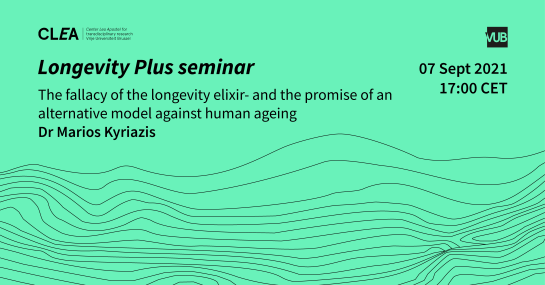We are cordially inviting you to the online seminar The fallacy of the longevity elixir- and the promise of an alternative model against human ageing by Dr Marios Kyriazis. Longevity Plus seminar series are organized by our new CLEA Longevity Plus Research Group: a transdisciplinary approach to wellbeing. The group aims to integrate and elaborate scientific approaches towards a long and happy life.
Zoom Meeting link: https://zoom.us/j/95528217436?pwd=ZHlLOEhoS05pSkVMOFBCeUpVOWRVQT09
Meeting ID: 955 2821 7436
Passcode: x6dtff
Facebook event: https://fb.me/e/HMqFBd8G
Dr Marios Kyriazis
The fallacy of the longevity elixir- and the promise of an alternative model against human ageing
The notion that it is possible to eradicate age-related degeneration and live a life with a minimal rate of senescence by utilising a physical ‘repair-only’ approach, is flawed on a number of fronts. In the therapeutic sense, there is a distinct separation between age-related diseases, and the background process of ageing itself. It is quite possible that biomedical technologies will prove invaluable in treating or alleviating the impact of age-related degenerative diseases such as cardiovascular disease, arthritis or dementia. However, when it comes to addressing the fundamental, background stochastic nature of ageing, it is unlikely that regenerative biotechnologies will have any appreciable impact. Here, I discuss some essential conceptual obstacles, both functional and translational, which will prove overwhelming and which preclude the notion that ageing can be eliminated by using physical therapies. I will argue that there are so many unknown variables embedded in this line of thinking that make the final result impossible to predict.
My reasoning is two-fold: 1. Disruptive regenerative biotechnologies interfere with the complex, dynamic topological architecture of the human organism, in a manner that will render them unsuitable for clinical use. 2. Even if some regenerative biotechnological treatments are developed in the laboratory, the translational issues will be insurmountable, and the treatments will thus be practically unusable by the general public at large. Instead, the answer must lie in more global and abstract methods which align well with evolutionary mechanisms based on techno-cultural societal necessities. These are likely to operate in a way which ultimately will downgrade the evolutionary importance of human ageing. I will present a novel integrative concept, which may decrease the impact of ageing in participating humans. This model is based on a more inclusive worldview, examining the relationship between humans and their environment, the integration of humans with technology, and the biological consequences of an increasingly techno-cognitive ecosystem.
Bio:
Marios Kyriazis qualified as a medical doctor (MD) from the University of Rome, Italy, and after preclinical work in the USA he worked as a clinician in acute medicine in Cyprus, and the UK. He subsequently qualified as a Gerontologist with interest in the biology of aging and became a Chartered Member of the academic organisation ‘Royal Society of Biology’ in the UK. He also has a post-graduate qualification in Geriatric Medicine from the Royal College of Physicians of London.
Other appointments include Member of the Board of Trustees at the Mediterranean Graduate School of Applied Social Cognition, affiliate researcher at the Evolution, Complexity and Cognition Group (University of Brussels), Expert assessor, (European Commission), Member Biological Complex Systems Alliance, and a Ronin Research Scholar.
Currently, he is the scientific director of the National Gerontology Centre (Cyprus) in association with the Ministry of Health. His research is focused on transdisciplinary models and explores common principles between biology, complexity sciences, evolution, cybernetics, neurosciences, and techno-cultural elements. Areas of interest include robustness and degeneracy in organic systems, fragility and redundancy, repair processes (including self-repair), hormesis and environmental enrichment in aging, and immortalisation of somatic cells. His recent publications include papers on the complexity of aging, technology and society, as well as books on hormesis.
More details can be found here: https://www.indispensablesoma.info/

Read more about CLEA Well-being and Social Progress research: https://clea.research.vub.be/en/clea-longevity-plus-research-group
